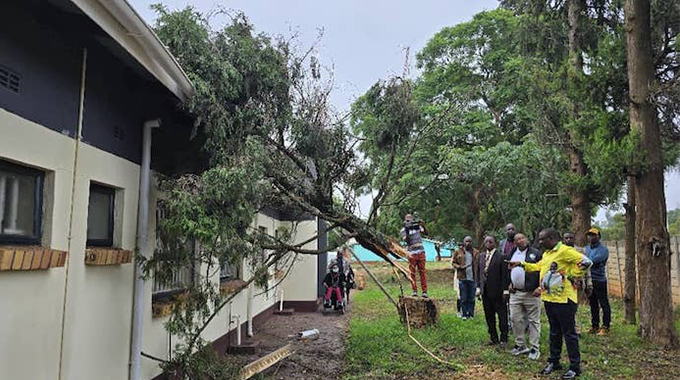‘Scientific research should respond to nation’s needs’

Blessings Chidakwa, Harare Bureau
AS the Second Republic continues to create an enabling environment to accelerate modernisation and industrialisation, all scientific research should be contextualised to respond to the country’s needs, President Mnangagwa has said.
Already, President Mnangagwa, who is the Chancellor of all State universities, has established industrial parks and innovation hubs at the country’s tertiary institutions that have made remarkable progress in import substitution through the production of goods and services locally.
Addressing delegates at the Harare National Research, Science, Technology and Innovation conference yesterday, President Mnangagwa challenged the private sector to desist from being bystanders but should partner and support research. The conference ran under the theme, “Coordinating and Promoting Research Towards the Attainment of Vision 2030 and Beyond”.
“Research outputs must feed into our growing industries and industry must equally inform, guide and request research into pertinent industrial priorities towards improving production and productivity as well as the range of products and services.
“This provides scope for the development of strategies that must scale up high-impact research outputs for addressing the present and future socio-economic and scientific needs of our nation,” he said. President Mnangagwa challenged the Research Council of Zimbabwe and all stakeholders in the research and innovation space, to be engaged in transformative research that improves resilience among the communities and a higher quality of life for the people.
The Head of State and Government said that gone are the days when researchers would research “why grasshoppers freeze in winter”.
“Research must be correctly contextualised into our present national needs, realities and development priorities. Scientific inquiry across priority areas such as agriculture, mining, healthcare, nutrition, transportation, safety and security as well as climate change and space science, among other fields, are welcome.
“Partnerships and synergies with other regional and global professional bodies and centres of excellence are equally encouraged to enhance your work where possible, we should not re-invent the wheel,” he said.
President Mnangagwa added that dialogues and partnerships in research are invaluable for leaping forward the multi-pronged national development agenda.
“To the private sector, industry, Micro, Small and Medium Enterprises, I urge you not to be bystanders, jump on to this moving train; partner and support researchers, innovators and inventors,” he said.
“Singleness of purpose and seamless co-operation as well as structured academia-industry collaborations, are critically important.
“The ‘publish or perish syndrome’, without regard for the effectiveness of research in addressing critical issues of human development and progress, is not acceptable.

President Mnangagwa
“The tendency among researchers and institutions to operate in relative isolation from one another, thus, failing to benefit from the synergies and collaborative approach to research, should now be a thing of the past,” he said.
President Mnangagwa said as is outlined in the National Development Strategy 1, there should be commercialisation of intellectual property through a co-ordinated, harmonious and effective research output value-chain.
The President said as the adage goes “Njere moto dzinogokwa”, researchers must learn from their peers, other institutions and communities, as well as progressive jurisdictions and cultures to master technologies, while adapting them to local conditions.
“This is more so as research outcomes, goods, products and services emanating from collaborative research and development often have a better chance of effectively competing on regional and global markets,” he said.
President Mnangagwa said sustained linkages among stakeholders, including research and industry also ensure the continuation of the culture of innovation and learning.
He also emphasised that a balance must be reached between external perspectives and approaches with the heritage-based and locally generated science, technology and innovation.
“We must remain Zimbabwean and African in our thoughts and deeds. This is a key ingredient for economic growth, modernisation, industrialisation and overall global competitiveness.
“Through research and innovation efforts, Zimbabwe must realise industrialisation in Tsholotsho, Binga, Muzarabani, Chipinge, Kanyemba, among other areas,” he said.
President Mnangagwa said efforts to strengthen the national capacity for managing intellectual property generated within the country are a priority and legal minds must come on board and protect all outputs of Zimbabwe’s research and innovation revolution.
The President said the Research Council of Zimbabwe should re-invent itself as an apex organisation, more so in the context of a robust and ever-expanding research, science, technology and innovation ecosystem.
He said the Government created an enabling research and invention environment, which resulted in the re-configuration of the education system, to Education 5.0 as well as the creation of Innovation Hubs and Industrial Parks.
President Mnangagwa said it is also pleasing to note that the country’s education sector is prioritising continuous curriculum review, with emphasis on developing skills and competencies in Science, Technology, Innovation, Engineering, and Mathematics.
“This lays a sound foundation for a scholarship culture, critical thinking, objective analysis, and problem-solving among our students.
“I expect that the education review processes, coupled with effective research spaces, will see our young talented boys and girls having broader access to a robust research and development ecosystem. It is this approach that will catalyse the realisation of our full national potential and prosperity”.
Turning to the media, the President said the Fourth Estate must play its part and transition from merely reporting on the establishment of innovation hubs and industrial parks.
“Instead, the media must unpack and enlighten our societies of the specific innovations and how these will change and impact the lives of our people, village by village; city by city and the national economy as a whole,” he said.












Comments